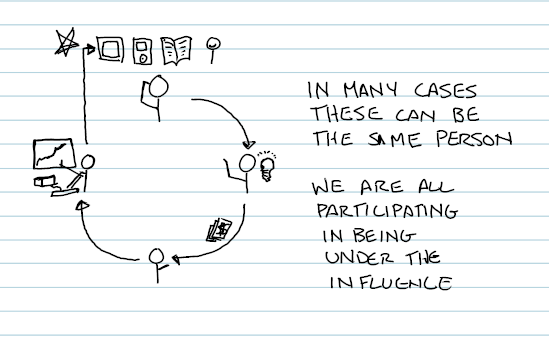The shortest distance between a person becoming aware and buying – the act of exchanging currency at a higher rate than the service or product costs to produce – is the marketer’s benchmark. As such their motives should inherently be held suspect and yet we believe what they want us to believe.
Time is one of the key battles marketing message fight. Given enough time, anyone can sell anything (ideas or products), some better than others. People have been told time is money and usually that is true for the other person – your time is someone else’s money. Someone else’s time is likely yours. As such, marketing messages are short and repetitive – visually and aurally. It gets cleverer when the messages appear genuinely – products placed in unassuming ways that relate activity or quality to the product or service. Simplified messages attack the largest audience to force an action – thought or behavior. How much of what we know is fabricated?
Science and technology folks are all about details and complexity. One cannot fully appreciate wonders without understanding the complexity – one of the reasons we know less than we should. Scientists strive for truth or work with it to change it. Exactness is important. Any fudge work is noted and already calculated to be insignificant in the context of a more import result. They are biased, but their motives are purer. Of course corruption exists everywhere, so absolutes are tough to swallow. Scientific evidence is often positioned to accentuate the beauty but hide the wrinkles. We hold beliefs that are not always proven by a scientist or better yet ourselves-we call this faith. What do you have faith in?
I am not as interest in what people have faith in as much as that they do so readily. With good marketing, people believe and behave under the influence. People are generally anxious about mind control yet almost everything has been fabricated and more importantly specifically for you and people like you. As much as we are individuals we are actually more alike than not – scarily alike when it comes to what you think, what you believe and what you buy.

It is no wonder that so many people in the fields of communication, branding and marketing feel so powerful – their message in total create so much of the world. They start as the rock falling into the pond allowing ripples to hit us as they may. They drop more pebbles at the right times reinforcing messages, creating relationships and intimate richness. They are the origin and orchestration of the following conversation in what appears to be naturally occurring ripples. As individuals we faithfully internalize, reform and repeat – generating thoughts and actions that others listen to. These messages become defining attributes. Many people like fine wine, food, clothes, automobiles and the latest personal technology. Many desire upgrades to their current lifestyle in those ways and aspire for private jets, multiple homes in multiple countries and more. People consume what is made consumable. The rate of new content production for the individual is slower than the rate of content an individual produces based on someone else’s content. How much of what you think is new? When you talk, how much of what you say is something someone else said? How much of what you feel is yours?
Marketing messages create physiological changes in our understanding of reality – they are not artificial impacts. What is suspect is the initial message we chose to have faith in. If we inspected every message for such qualities we would crawl to a halt. It is not practical and, for better or worse, we are unavoidably consuming. This is excellent news for those who actually know how to communicate. The power to create the world’s thought and behavior is in the hands of those that strike clear and simple messages, rooted in fact and garnished in fashion.

